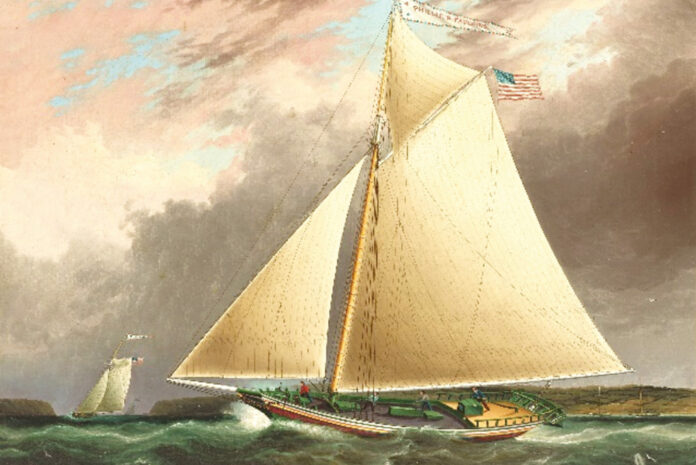by Edward Ellis, Special Correspondent
Believe it or not, New Bern was once one of the country’s premier ports. In league with Boston, New York, Baltimore, and Charleston, magnificent sailing ships visited the town’s busy waterfront on routes to Europe, the Bahamas, and the Caribbean islands. Here’s a little shipping news from long ago:
• Captain Abraham Outten and his crew fought the seas for hours before giving up the brig Gorton in a severe Atlantic gale on January 22, 1791. According to the Independent Gazetteer of Philadelphia, the large Haitian cargo ship was bound for New Bern when it sprang a leak in the storm. After pumping furiously for two hours, the captain and crew of nine men “determined to quit her.” Getting a small launch overboard, rigged, and provisioned with a few necessities took hours. From the launch, the sailors witnessed the Gorton slip beneath the waves. After thirteen hard days and nights, they landed on Cat Island in the central Bahamas “where they hired a small sloop” and arrived in Nassau five days later.
• Connecticut’s Hartford Courant reported on March 21, 1791, the demise of a vessel from New Bern – and named for the town – off the west coast of England. The good ship Newbern was bound for Glasgow, Scotland with a load of naval stores when it ran aground on the spit of Hoyle Banks. The captain, John Scott, was drowned along with a passenger and the cook. A fishing boat saved the others on board.
• In October 1791, Judge John Sitgreaves clapped Nathan Rounds in the New Bern jail for hijacking an anchored sloop called Polly in the West Indies. A Philadelphia newspaper reported that the vessel carrying sugar, gin, tea, and cash went aground between Ocracoke and Beaufort. The only other person on board was “a lad named Maxwell.” Rounds hired horses to go to Beaufort but asked how to get to Ohio and Norfolk making himself suspicious enough that a sheriff began asking questions. The stories of Rounds and Maxwell did not match. Rounds was found to possess some of the former captain’s clothes and $1,200 in cash – about $41,000 in current money. At New Bern, Judge Sitgreaves impounded the money, ordered the vessel and its goods to be sold for the benefit of its New England owners, and sent Rounds to the hoosegow.


